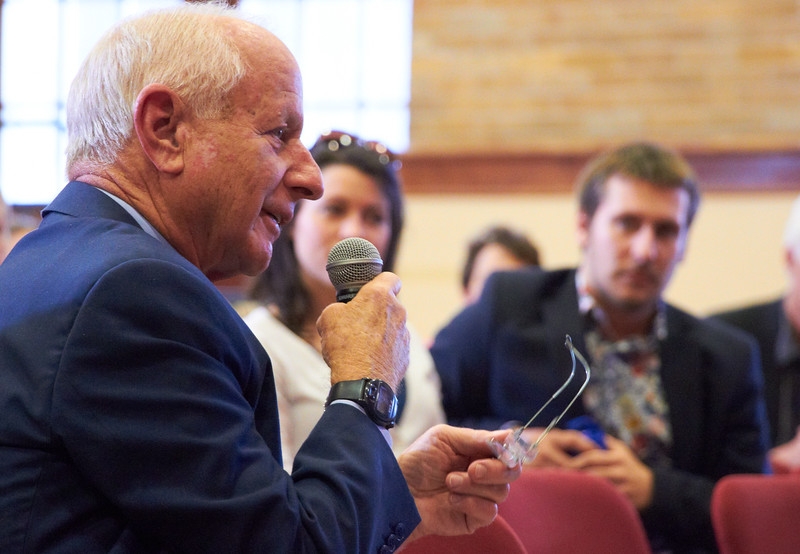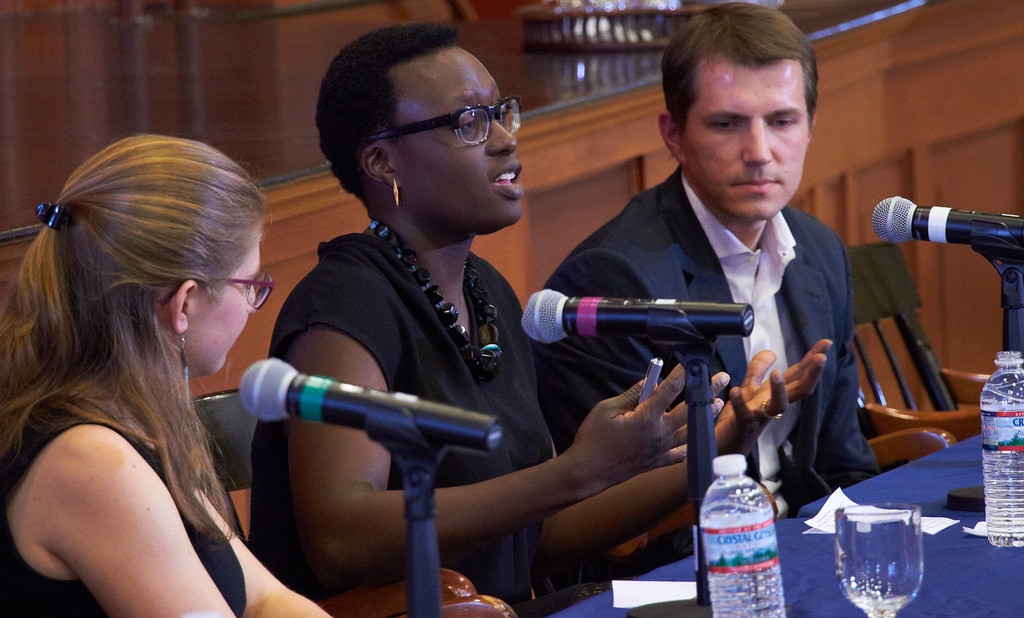Davis United World College Scholars Program Marks 15 Years
MIDDLEBURY, Vt. – Students, faculty, staff, and friends gathered in Wilson Hall on April 16 to mark the 15th anniversary of the Davis United World College Scholars Program. The program, which is headquartered at Middlebury, provides scholarships to students who have completed two years at one of 15 United World College (UWC) schools around the globe to attend participating colleges and universities in the United States. In its 15 years, the program has provided $400 million in scholarship aid to students, making it the largest international scholarship program for undergraduates in the world.
Middlebury President Ron Liebowitz introduced the program’s founders, philanthropist Shelby Davis and Davis UWC Scholars Program Executive Director Phil Geier, both of whom were in the audience. Davis and Geier launched the program in 2000 as a way to foster international understanding through education. Davis stood to greet the audience, noting that his work with Davis UWC Scholars Program is a natural extension of his career as a financial investor.
Davis said that when he meets Davis UWC scholars, “They always ask me, ‘Why did you give me a scholarship?’ and I say, ‘I’m not giving you a scholarship; I’m investing in you because you’ve shown winning habits.’”


Investment in promising students has been a consistent theme of the Davis UWC Scholars Program since its founding. The program began with 43 scholars and currently hosts more than 2,500 scholars. The five original partner colleges, which included Middlebury, have grown to include 91 partners throughout the U.S.
The first presentation of the afternoon included a panel of two Middlebury Davis UWC alumni and one current Middlebury student. The panel was moderated by Mukul Kumar, president of UWC-USA, who asked the panelists to reflect on various aspects of their UWC experience and how it impacted their lives.
Panelist Joanna Opot ’05, a Middlebury graduate from Kenya, said that her UWC experience and the remarkable network of UWC alumni around the world led her to her dream job as West Coast head of business development for the social investing company Acumen. “The opportunity to be able to channel finance to build companies that not only provide a service, but create jobs, is a dream come true, which is only possible from my UWC and Middlebury experience.”
Opot’s fellow panelists included Sarah Nodder ’15 and Martin Rajcan ’06, who is principal for private equity with Kohlberg Kravis Roberts in London.
A second panel moderated by Middlebury Executive Vice President Mike Schoenfeld ’73 featured representatives from four partner schools, who commented on how their participation in the Davis UWC program has enriched their institutions. Darron Collins, president of College of the Atlantic–one of the original five partner schools–described the presence of Davis UWC students on his campus as one of the most significant events in the college’s history. “When we have classes that are 10 or 12 people, 15 at max, and three to four of them are from different continents, that completely changes the conversation.”
Jacqueline Leighton, director of the Davis International Center at Princeton University, said that, in listening to the student and alumni panel, she was struck by the frequency of words she didn’t typically associate with business. “I’m really happy and inspired to hear from our students how they can take their deep sense of empathy, independence, humility, and desire to impact social change with an eye towards business and entrepreneurism.”
Middlebury Provost Susan Baldridge also found the student panel moving. “It left me feeling optimistic about the future when we are producing at Middlebury, and through these programs, people who are wanting to be engaged with the kinds of really complicated problems that exist in the world,” said Baldridge. “They are difficult problems and they are often about very troubling things, and yet I think we heard three extraordinary people talking about their willingness to engage those problems, figure out how to try to solve them–not alone, but in collaboration with other smart people.”

